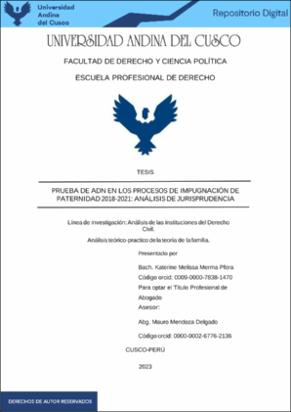| dc.contributor.advisor | Mendoza Delgado, Mauro | |
| dc.contributor.author | Merma Pfora, Katerine Melissa | |
| dc.date.accessioned | 2023-10-04T16:03:11Z | |
| dc.date.available | 2023-10-04T16:03:11Z | |
| dc.date.issued | 2023-06-30 | |
| dc.identifier.uri | https://hdl.handle.net/20.500.12557/5732 | |
| dc.description.abstract | El presente estudio de investigación nace a raíz de que en los procesos de impugnación de
paternidad se supone que se resolvería las pretensiones solo con la acreditación de los padres
biológicos, sin embargo, existirán casos en que el niño, niña o adolescente, hayan
desarrollado, dentro de su identidad, una historia familiar y apego sentimental donde
identifiquen como su padre aquel que lo ha reconocido y esa realidad es parte de su
derecho al libre desarrollo de su personalidad. En tal sentido el propósito de la presente
investigación ha sido determinar cuál es el tratamiento jurisprudencial de la determinación
de la identidad del niño y adolescente frente a los resultados de la prueba de ADN en
procesos de impugnación de paternidad. Pues, las críticas a esta teoría están referidas a que
el niño o adolescente podrían ser manipulados para manifestar una historia que en la realidad
no existe. Es por ello, que el presente estudio se aborda con un enfoque cualitativo,
asumiendo el tipo dogmático jurídico. Por tanto, como resultado es de indicar que el
tratamiento jurisprudencial de la determinación de la identidad del niño y adolescente frente
a los resultados de la prueba de ADN en procesos de impugnación de paternidad, que el
tratamiento jurisprudencial en el Perú sobre la determinación de la identidad del niño o
adolescente frente a los resultados de la prueba de ADN en procesos de impugnación de
paternidad es muy cuidadoso y protege los derechos fundamentales del menor, al mismo
tiempo que busca determinar la verdad biológica para garantizar el interés superior del niño
o adolescente. | es_PE |
| dc.description.abstract | The present research study was born as a result of the paternity challenge processes, it is
assumed that the claims would be resolved only with the accreditation of the biological
parents, however, there will be cases in which the child or adolescent has developed, within
their identity, a family history and sentimental attachment where they identify as their father
the one who has recognized him and that reality is part of their right to the free development
of their personality. In this sense, the purpose of the present investigation has been to
determine what is the jurisprudential treatment of the determination of the identity of the
child and adolescent against the results of the DNA test in paternity challenge processes.
Well, the criticisms of this theory refer to the fact that the child or adolescent could be
manipulated to express a story that does not really exist. That is why the present study is
approached with a qualitative approach, assuming the legal dogmatic type. Therefore, as a
result, it is worth indicating that the jurisprudential treatment of the determination of the
identity of the child and adolescent against the results of the DNA test in paternity challenge
processes, that the jurisprudential treatment in Peru on the determination of the identity of
the child or adolescent in relation to the results of the DNA test in paternity dispute
proceedings is very careful and protects the fundamental rights of the minor, while at the
same time seeking to determine the biological truth to guarantee the best interests of the
child or adolescent. | en_US |
| dc.format | application/pdf | es_PE |
| dc.language.iso | spa | es_PE |
| dc.publisher | Universidad Andina del Cusco | es_PE |
| dc.rights | info:eu-repo/semantics/openAccess | es_PE |
| dc.rights.uri | https://creativecommons.org/licenses/by-nc-nd/4.0/ | es_PE |
| dc.subject | Prueba de ADN | es_PE |
| dc.subject | Impugnación de paternidad | es_PE |
| dc.subject | Derecho a la identidad | es_PE |
| dc.title | Prueba de ADN en los procesos de impugnación de paternidad 2018-2021: análisis de jurisprudencia | es_PE |
| dc.type | info:eu-repo/semantics/bachelorThesis | es_PE |
| thesis.degree.name | Abogada | es_PE |
| thesis.degree.grantor | Universidad Andina del Cusco. Facultad de Derecho y Ciencia Política | es_PE |
| thesis.degree.discipline | Derecho | es_PE |
| dc.publisher.country | PE | es_PE |
| dc.subject.ocde | https://purl.org/pe-repo/ocde/ford#5.05.00 | es_PE |
| renati.advisor.dni | 23992910 | |
| renati.advisor.orcid | https://orcid.org/0000-0002-6776-2136 | es_PE |
| renati.author.dni | 73074504 | |
| renati.discipline | 421016 | es_PE |
| renati.juror | Rivero Ynfantas, Fernando | |
| renati.juror | Mujica Paredes, Boris Germain | |
| renati.juror | Jayo Silva, Carlos Eduardo | |
| renati.juror | Zereceda Vasquez, Juvenal | |
| renati.level | https://purl.org/pe-repo/renati/level#tituloProfesional | es_PE |
| renati.type | https://purl.org/pe-repo/renati/type#tesis | es_PE |
| dc.description.lineadeinvestigacion | Análisis de las instituciones del Derecho Civil Análisis teórico-practico de la teoría de la familia. | es_PE |




